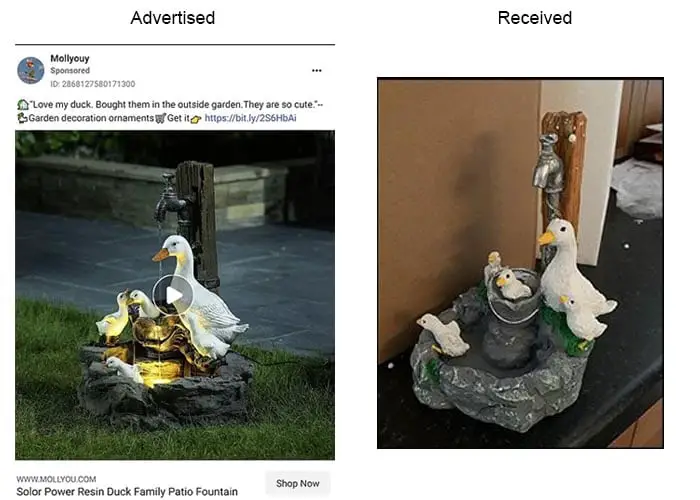The number of counterfeit scams using the Facebook Sponsored Ad platform has skyrocketed in 2021. We take a look at many of these scams, see how they’re ripping off not only Facebook users but also online content creators, and see what people can expect to get if they buy from these ads.
Online counterfeit websites have been a threat on the Internet for some time, but during a time when lots of people have been in lockdown and Internet shopping has become vastly more popular, counterfeit scams have skyrocketed. And the crooks behind them have flocked to advertising their schemes on Facebook, presumably to exploit the social media’s sluggish and reactive reputation to dealing with such scams.
Scammers on Facebook are setting up Sponsored Ads – the adverts that can appear on any Facebook user’s newsfeed – promoting any number of products at discounted prices. In some cases the adverts claim to be selling “mystery boxes” or “unclaimed packages from Amazon, Target or Walmart”.
When Facebook users click the link and purchase products on the website they’re directed to, they will receive poor quality rip-offs that bear little or no resemblance to the products advertised. In many cases, victims have reported receiving entirely different products than what was advertised.
Worse still, some users reported receiving nothing at all or even just empty packaging.
Sponsored Content. Continued below...
Many Facebook users who have fallen for these scams have posted their own photos of what they have received from the counterfeit websites. We took a look at some examples.
This Facebook Sponsored Ad on the left (below) shows a resin garden fountain with solar powered lights that is around 18 inches tall. It’s a real product from a company called LuxenHome and available on sites like Amazon and Home Depot.
However, if a user clicks on the ad and buys the product, they’re sent the product in the photo on the right (below). It’s a cheap plastic model only a handful of inches high with no solar powered lights. The difference in quality is abundantly clear.


At the time of writing, the Facebook Ad Library revealed there were currently 46 active adverts promoting this single counterfeit product. (Below.)
But these scams can get far worse. Take the next example, where the Facebook Sponsored Ad (below left) promises toe capped microfiber road skates. According to multiple reviews on the Facebook page, those who purchased the skates had to wait 8 weeks until eventually receiving a toilet brush (below right). Yes, you read that correctly.
At the time of writing, the Facebook Ad Library reveals there are currently 33 Facebook ads that are identical to this advert currently active on Facebook. (Below.)
The plethora of scam Facebook Sponsored Ads are not only ripping off and hurting those who fall for these scams. They’re also using content created by online sellers, digital artists and video bloggers to help peddle the scams.
For example, the below sponsored advert claims to be selling an LED Indoor Houseplant by Fluora.
The advert contains a nice introductory video by the Fluora team introducing the product. However, the sponsored ad has nothing to do with Fluora. The video was stolen from their KickStarter page, uploaded to a sponsored ad and used to peddle knock-off, counterfeit products. To add insult to injury, the real Fluora LED Indoor Houseplant isn’t even on the market yet.
At the time of writing the Facebook Ad Library reveals there are around 300 identical adverts that have stolen content from Fluora currently active on Facebook. (Below.)
Another example is the extremely popular “unclaimed Amazon packages” sponsored adverts that claim to offer mystery boxes full of Amazon returns. Such a post is below.
Again the video used in the sponsored ad has been stolen, this time from an online influencer in the technology niche known as Frank Passalacqua, who had been unpackaging a shipment he had received from a legitimate website called Liquidation.com a number of years ago.
Unbelievably, at the time of writing there are over 5000 different sponsored ads using the “unclaimed packages” niche. (Below.)
Again those who purchase such products are getting either nothing or unrelated low value items, some even reporting receiving empty packaging.
Many of the sellers and influencers who have had their content ripped off and used to promote counterfeit scams have reported it to Facebook, including Frank Passalacqua and Fluora. And while Facebook claims to take these reports seriously and uses artificial intelligence to automatically identify and remove these schemes, new adverts quickly pop-up using the same ripped-off content.
Sponsored Content. Continued below...
In fact, while investigating this article, we uncovered over 10,000 different adverts listed in Facebook’s Ad Library that were leading to probable counterfeit websites. This included scams in the technology, home and garden, fashion and toys niches. And it still appeared to us that we were all but scratching the surface of this vast and organised criminal enterprise.
It seems Facebook’s artificial intelligence and reporting features still need plenty of work if the social media platform is to have any chance of getting on top of this surging epidemic of counterfeit sponsored ads.
In the next section we will go into how to spot and avoid these counterfeit scams.
Thanks for reading, we hope this article helped, but before you leave us for greener pastures, please help us out.
We're hoping to be totally ad-free by 2025 - after all, no one likes online adverts, and all they do is get in the way and slow everything down. But of course we still have fees and costs to pay, so please, please consider becoming a Facebook supporter! It costs only 0.99p (~$1.30) a month (you can stop at any time) and ensures we can still keep posting Cybersecurity themed content to help keep our communities safe and scam-free. You can subscribe here
Remember, we're active on social media - so follow us on Facebook, Bluesky, Instagram and X